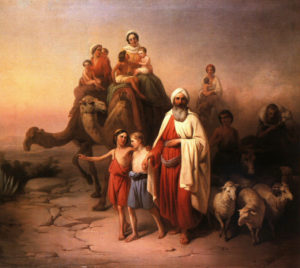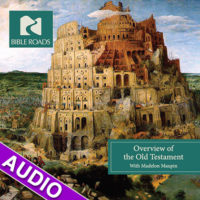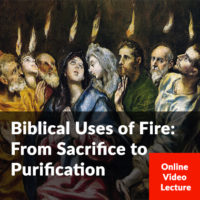
Jozsef Molnar, Le voyage d’Abraham d’Ur à Canaan, 1850, Galerie Nationale Hongroise, Budapest
With a new year, who better to look at biblically than Abraham, that Scriptural template for new starts. His life spans 14 chapters in the book of Genesis (from 11 – 25) and weaves an extraordinary story of faithfulness, mistakes, and renewed efforts. I’ve loved reviewing the sweeping events of this Patriarch of Israel’s life, not just because he is a key figure in the world’s three great religions –Judaism, Christianity and Islam –or even because his story launches the Bible’s ancestral narratives.
Rather, Abraham embodies timeless qualities we can model today: flexibility, openness, willingness and especially faithfulness. As you think about 2019 and your spiritual progress, it’s hard to aim higher than hearing and following God’s direction which requires trust and obedience, qualities that Abraham models – most of the time!
Below are six key events with lessons that yield, like interconnected threads of a tapestry, a life shaped by spiritual pursuits that grow into blessings for an entire nation. This process of examining some of his pivotal moments has been instructive in discerning turning points that can fill a life with contribution, meaning, and influence.
Please share what these mean to you or add any of the other signposts you’ve noted in his spiritual journey that are helpful on your own.
- Abram, his original name, received God’s call (Gen. 12) to leave Ur in Mesopotamia–south of today’s Baghdad, Iraq—to relocate to an initially unnamed land God would provide. The unstated outcome of following this divine directive meant forfeiting his inheritance –all the animals, household possessions and land–from Terah, Abram’s father. The fact that God promised the blessing of new land still meant turning away (as the expression goes) from ‘the bird in the hand (Ur) worth two in the bush (the promised land)’. Attributes: willingness, readiness, humility.
- Abram’s faith in God causes him to obey, a singular act so powerful that 2000 years later a young Pharisee-turned-apostle, Paul, will point to it as the model for the faith that new Christ followers (“all who believe”) will need on their spiritual journey (see Rom. 4:11). This obedience is all the more remarkable considering the promise of heirs in spite of Sarai’s barrenness, the central challenge of the Abraham saga. Attributes: trust, conviction, faith.
- Abram’s story is not just his own but a precursor to the nation of Israel’s experiences as well. In fact, God’s call in Gen. 12:1-3, is considered a ’fulcrum text’, meaning one that is central to both past and future events. For the past, the text declares that God’s call to Abram will bless ‘all the families of the earth’, meaning those mentioned prior to Abram in Gen. 1 – 11 (Noah, his son Shem, and others). These verses of God’s call then point forward to the rest of Genesis where the beginning story of the ‘great nation’ commences with the stories of Abraham’s heirs (Isaac, Jacob, and Joseph). How Abraham answers God will affect all those future children, families, and tribes, although Abraham himself won’t see this. The patriarch’s positive response to the sudden divine directive of his calling reveals more spiritual qualities. Attributes: obedience and vision.
- Abraham is already in his 7th decade, not exactly the time most people call the moving van and take off! The journey was 560 miles northwest through the Fertile Crescent, along the Euphrates River to Haran, in eastern Syria. Attributes: grit, persistence, stamina.
- Along the route of his journey, Abraham is not told where this land or final stop will be, yet he continually builds altars as an acknowledgment of his faith in this God he cannot see. How beautifully this tees up what his grandson, Jacob, will do in Gen. 35, when he too will build an altar, acknowledging the Almighty’s presence every step of the journey: “He has been with me wherever I have gone” (Gen. 35:3). We can only imagine how Abraham and his family told the stories of such stops and how this thankfulness for God’s blessings carried to subsequent generations. Attribute: gratitude.
- When in Haran, Abram is again directed to pick up and move the family, flocks and possessions. Now seventy-five, he is finally told that Canaan is indeed the promised land. Yet on arrival, he discovers no milk and honey but a terrible famine, one more test for Abram’s faith. So he heads South to Egypt in order to survive, an act later generations will imitate. Like many life journeys, Abram makes a bad decision to ensure his own survival, positioning the much-desired Sarai as his sister. (He reasoned that if the Egyptians knew she was Abram’s wife, they would kill him and take her.) Gen. 20:12 reveals that they actually were half-siblings. But failing to truthfully acknowledge Sarai also as his wife enables Pharaoh to take the beautiful woman into his home, paying Abram a significant amount in servants and animals as a dowry.
What a terrible price Abram’s cowardly, self-serving actions have cost: he loses Sarai, and she loses her honor since the ‘marriage’ with Pharaoh was no doubt consummated. Yet in spite of Abram’s duplicity, the deceived (Pharaoh) is punished instead of the deceiver (Abram). Although the Pharaoh experiences plagues for his involvement with Sarai, he is a model of generosity, allowing Abram and Sarai to leave Egypt with all their possessions, thus becoming an example of how God is always in charge, saving his children even when they’ve erred. Attribute: learning from the sin of self-centeredness.
Perhaps this last episode is the nadir of the father of Israel’s life, yet it is also the precursor to what the nation of Israel will itself experience: the ups and downs of obedience, not unlike our own lives perhaps. This is one of the dozens of reasons the Bible continues to guide us on our journey from whatever ‘Ur’ we come from to our own ‘promised land’.




I had just finished reading the Christian Science Bible Lesson on Sacrament before I read this. That Lesson spoke to me of unselfish yielding to God’s perfect plan regardless of one’s “personal” view of one’s circumstance and what should happen or what should be “fixed.” God’s plan is always perfect, better than human outlining proceeding from human planning or wants. HUMILITY. And your comments seemed to say that that is exactly how Abraham proceeded—following God’s plan.
This was a very inspirational article so appreciate for this time of the year. Thank you sharing.
I find these so inspiring and have shared them with other friends who love The Bible, and a few that know little of it.
Many thanks for sharing your knowledge
Thank you! I just shared this with a group of ladies with whom I am reading the Bible from coverto cover this year. We’ve been reading about Abraham, so it fit perfectly. You expanded on what I had been feeling about Abraham’s incredible sense of trust and obedience. What a role model!
I’ve never thought of Abraham this way before. Reason 6, when Abraham lies to the Egyptians to protect his wife for fear that they’ll take her away, reminds me of a paraphrased saying that goes something like, “that which you fear will be thrust upon you.” I’m not sure where it’s from, I thought it was either the Bible or in MBE’s writings, but cannot find it in the Concordance. Anyway, I have experienced situations where if I was afraid of an outcome and prayed to remove the fear, then the outcome wouldn’t happen, or it was nothing to fear… Read more »
Thank you for this article, very timely in my life. Always, God is in charge! Blessings
Thank you, Madelon; helpful!
And, Michael: I looked in the book of Job and found:
“For the thing which I greatly feared is come upon me, and that which I was afraid of is come unto me.” (Job 3:25)
Good reminder that fear generates its own outcome!!
😊
I too read this week’s lesson before reading this and have always appreciated the example Abraham left for us. That childlike trust to do or go wherever God leads us, no questions asked, just trusting His guidance, knowing that God would never place us anywhere that was not safe and good for us, even if it makes us grow. I love how the Lord’s Prayer is carried throughout this lesson where Hannah hallows the name of “Our Father, who art in heaven” and how Jesus prays that God’s will be done and not his own. How He shares his “daily… Read more »
Thank you so much, Madelon!
Your explanations of Bible characters always bring them into better focus, and this beautiful synopsis of Abraham is no exception. He becomes a very warm and wonderful man who always strives to do the right thing, and is a role model we can all aspire to.
From now on I will always see him in this way. Thank you again.
I just love Abraham’s (initially Abram) faith, willingness, and trust. What an awesome example for us all. And bless you, Maddie, for reminding us of these wonderful attributes. Looking forward to studying Genesis, and of course, Abraham, with you at CedarS next fall.
At the tender age of 22 I left my Ur (Texas) to come to the Promised Land (California) to study singing with a reputable voice teacher. My motive was to become GREAT so I could prove to those Ur-ites I was worthy and capable…not the purest of motives to learn and perfect a lyric craft and art! In the Promised Land I was led to Christian Science and to have class instruction. That alone protected me many years for what was to come. And I used (read mis-used this Science to bolster the self-will and grandiosity of what I wanted.… Read more »
Thank you so very much, Madelon for reminding us that Abraham is such an important role model as we enter a new year wanting to make significant strides in our spiritual journey. He pressed on trusting God all the way in spite of the ups and downs. We have much to learn and much to give–this helps me feel that we are so important to God and that we can trust him to help us go beyond what we think we are capable of.
Thank you so very much Madelon. This is the first time I became aware of the story where Abram presents Sarai as his sister and her involvement with Pharaoh.
Thank you also for adding the attributes at the end of each section.
A special gift to Sunday School teachers and Students. Actually to all students of
the Bible.
So much to learn. Your knowledge of the Bible is an inspiration
Very enlightening! Shared on our Reading Room Facebook page.
Thank you so much.